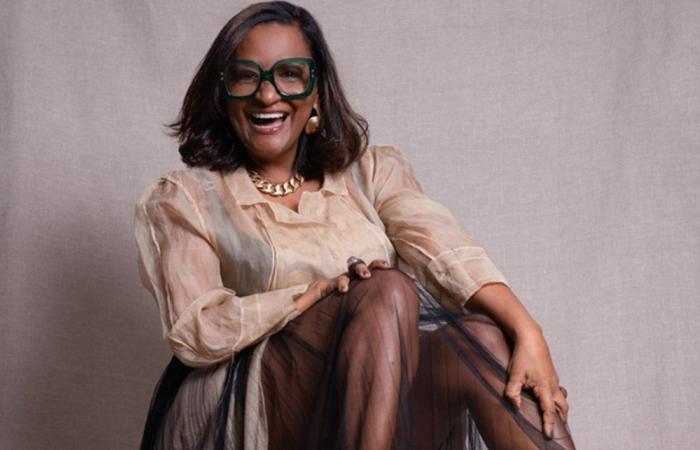Claudia Di Moura arrived to break paradigms. Born in Salvador, she began her artistic career almost 40 years ago, when she first stepped onto a theater stage. From then on, she embraced opportunities and played roles that earned her highlights and awards, such as best actress for the play Policarpo Quaresmain 2008.
Ten years later, at the age of 53, she gained national recognition when she played the maid Zefa, in Second suna soap opera shown at 9pm on Globo – which earned him a nomination for Best of the Year Award. Since then, he has been reaping other great laurels in his career. In 2021, he participated in the fourth season of the series Under pressurethe following year he joined the cast of Face and Courageand also participated in the feature film Revenge Therapydirected by Marcos Bernstein.
“My relationship with time is one of complicity”, she tells Vogue. “Not everything comes to me at the desired time, but always at the right time, and that sometimes still surprises me”, she admits, now at 59. “Today I have the an exact measure of maturity to face challenges. I am happy with my age, with my body, with the network of affections that only time allows me to build.”
Success, however, did not come alone in Claudia’s career. The actress is the mother of three girls: Dayse, Ana Vitoria It is Iasmin, and counts on their support to continue the journey marked by challenges. “The job market is cruel to women, especially black women, and even more so to those over 50″, he says. “I am aware that I am occupying a small space, where few achieve visibility and prominence. My daughters are promises fulfilled. The exchange of love that we experience supplies me, feeds me.”
Claudia is currently experiencing one of the most challenging moments of her career. The actress plays the character Gá, a leader of the Kaingang Tribe, in the children’s series Light, from Netflix. The attraction tells a family plot related to the original peoples. “Having been invited to play this role was a great honor, precisely because the series’ development team showed genuine care for the representation of indigenous peoples,” she noted. “We had the privilege of experiencing an immersion in Kaingang culture on the set of the series, which made a big difference and was extremely relevant and rewarding.”
Below is the full conversation:
Vogue: Tell us a little about your origins? About her family, where she was born, the context in which she was raised…
Claudia Di Moura: I was born into a loving, structured and united family, who lived most of their time in the extreme south of Bahia, a setting of inestimable natural beauty. I come from a lineage of strong and determined women, and I am proud to continue this leafy tree in the form of my daughters, who are certainly the best part of me.
V: Regarding the character Gá, from “Luz”, what is it like playing an indigenous leader? Did you go through any type of preparation?
CDM: We had the privilege of experiencing an immersion in Kaingang culture on the set of the series, which made a big difference and was extremely relevant and rewarding. Before that, however, I had already had and continue to have close contact with the Juerana village, in Porto Seguro, with which I have strong ties. And this community has a female leader of incalculable historical value, who is the chief Yamani Pataxó.
V: In “Luz” a white girl is raised in an indigenous tribe. What is her interpretation of this as an Afro-indigenous woman? Do you believe that somehow the story of her origin is being told?
CDM: Being invited to play this role was a great honor, precisely because the series’ development team showed genuine care for the representation of native peoples. In “Luz” the culture of these people is shown in a place of welcome and mentoring, a power of love so immense that it overflows even towards a white child. It is a different bias, another approach to these relationships, which values what is most glorious about us, and not just our permanent battle for survival. We are more than the brand of destruction that the colonizer imposed on us. We are beauty, wealth, knowledge and solidarity.
+ Beauty: On World Afro Hair Day, Camilla de Lucas talks about self-acceptance and hair transition
V: How do you see representation in art? How does this reflect on you? Do you see yourself as an example for other artists?
CDM: Representation is a complex mission, which involves the artist’s work, but above all it is a political movement that depends on the entire society. There is an outcry from all categories underrepresented in art, in production chains, in spaces of power. This screen time dedicated to the visibility of indigenous, black, LGBTQIAPN+, PWD, among others, is one of the driving forces for this social mobilization to remain strong and cohesive. And it is the merit of these silenced majorities themselves, it is our struggle yielding slow results. It’s not a gift, it’s an achievement. And achievements cannot be sustained idly. We are all in a permanent struggle to tear down the walls that make us invisible. But with every brick we knock down, a new one rises. This is work from which we cannot take a vacation.
V: Who are your inspirations?
CDM: Inspirations? Various. My mother and my daughters, inspirations in life. Passers-by and anonymous people, inspiration for creating my characters. MJ Rodriguez, Taís Araújo, Zendaya, Noma Dumezweni, inspirations for acting as an actress, to name just four of countless names.
V: You started your artistic career in theater and were revealed on TV after a certain age. How do you evaluate the market today for mature actresses?
CDM: The job market is cruel to women, especially black women, and even more so to those over fifty. I am aware that I am occupying a small space, where few achieve visibility and prominence. The ageism suffered by us women, which conditions our professional value to the duration of an unattainable beauty stereotype, is one of the most violent tools of machismo and needs to be combatted. Our bodies are not at the service of male fantasies of eternal youth. We are real people, with real desires, with real lives. We have a lot to say to the world through our workforce and our thoughts. We’re just getting started.
V: Did this choice come about due to maturity? Have you ever felt unprepared for this exhibition? How do you choose your works?
CDM: God has always given me battles the size of my weapons. Therefore, my relationship with time is one of complicity. Not everything comes to me at the desired time, but always at the right time, and that sometimes still surprises me. Today I have the exact measure of maturity to face the challenges that lie ahead, and these same challenges give me the necessary experience to deal with those that will come. I’m happy with my age, with my body, with the network of affection that only time allows me to build.
+ Celebrities: Luana Piovani recalls harassment she suffered from a director at the beginning of her career
V: Have you ever experienced any prejudice or harassment throughout your career?
CDM: Instead of focusing on situations of prejudice or harassment, I prefer to say that I learned to defend myself against the violence that is part of our daily lives, precisely because I don’t bow down or bend in front of them. And also because I’m not alone. By my side I have a powerful quilombo that rises up in the face of every frustrated attempt at oppression. I’m not unbreakable, I have my vulnerabilities, of course. But I am the one who determines how far the other’s power over me goes, and I don’t respond to the slap by turning the other cheek. I freeze the oppressing hand in midair, before a finger even touches my skin.
V: You are the mother of three women, two of them through adoption. Does your relationship with your daughters reflect on your art? In what way? What is your relationship with them like?
CDM: My daughters are promises fulfilled, my certainty of longevity. Not that I see them as copies of me, quite the opposite. I’m proud that they are so different and still choose to walk alongside me. The exchange of love that we experience supplies me, feeds me. And yes, I listen to them very carefully, I embrace their advice, I take them everywhere within my soul. Being a mother to such admirable women makes me a better woman, and this radiates into all areas of my life, including on stage.
V: On your social networks, you show your fashionista side a lot. Do you consider yourself a vain woman? What is your relationship with fashion like?
CDM: I am a person who seeks coherence between my speech and my image, who takes care of my own style as an intrinsic part of my art and my expression. And this doesn’t depend on expensive clothes, signed pieces. This has to do with my choices and the truth I want to dress myself as. I argue that everyone should embrace their own identity, make peace with it and show themselves to the world in their entirety, respecting their ethical and aesthetic decisions. Because more important than appearing to be what you are not, is showing what you are.
V: And how is your relationship with your self-esteem?
CDM: I am extremely happy in my skin. My smile reflects the joys of being who I am and living this moment of so much power. Without this self-esteem I would not have overcome half of the obstacles I have faced to get here. And my dream is that so many people diminished and devalued simply for being who they are, can also celebrate themselves and build within themselves a love greater than all these silencing.
+ Your Age: Alessandra Negrini reflects on self-esteem and unfiltered beauty: “Freedom is very important to me”






